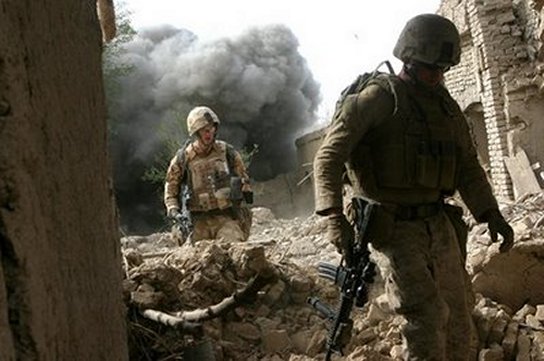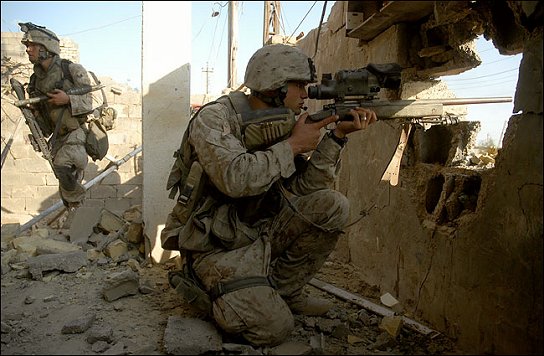« Prisoner Wrongly Imprisoned by Sotomayor Converts To Islam While In Prison | Main | Helen Thomas:"Not Even Nixon Tried to Control the Media Like Obama" »
July 02, 2009
Camp Leatherneck Marines Deploy on Major Mission Afghanistan

U.S. Marine Corps file photo by Sgt. Freddy G. Cantu
Largest Marine Offensive since Vietnam -Operation Khanjar - “Strike of the Sword” Begins
Operation Khanjar (Strike of the Sword) involved nearly 4,000 US forces as well as 650 Afghan police and soldiers, the Marine Expeditionary Brigade said, announcing the pre-dawn launch of the drive in southern Helmand province… Deploying about 50 aircraft, the air and land assault was to push troops into insurgent strongholds in what officers said was the biggest offensive airlift by the Marines since Vietnam… "What makes Operation Khanjar different from those that have occurred before is the massive size of the force introduced, the speed at which it will insert," MEB commander Brigadier General Larry Nicholson said in a statement… Troops would hold areas they take until they could transfer security responsibilities to Afghan forces, said Brigadier General Larry Nicholson .

Marines Deploy on Major Mission
Thousands Fan Out in Afghanistan's South in Crucial Test for Revised U.S. Strategy
CAMP LEATHERNECK
Afghanistan
July 2
Thousands of U.S. Marines descended upon the volatile Helmand River valley in helicopters and armored convoys early Thursday, mounting an operation that represents the first large-scale test of the U.S. military's new counterinsurgency strategy in Afghanistan.
The operation will involve about 4,000 troops from the 2nd Marine Expeditionary Brigade, which was dispatched to Afghanistan this year by President Obama to combat a growing Taliban insurgency in Helmand and other southern provinces. The Marines, along with an Army brigade that is scheduled to arrive later this summer, plan to push into pockets of the country where NATO forces have not had a presence. In many of those areas, the Taliban has evicted local police and government officials and taken power.
Once Marine units arrive in their designated towns and villages, they have been instructed to build and live in small outposts among the local population. The brigade's commander, Brig. Gen. Lawrence D. Nicholson, said his Marines will focus their efforts on protecting civilians from the Taliban and on restoring Afghan government services, instead of mounting a series of hunt-and-kill missions against the insurgents.
"We're doing this very differently," Nicholson said to his senior officers a few hours before the mission began. "We're going to be with the people. We're not going to drive to work. We're going to walk to work."
Similar approaches have been tried in the eastern part of the country, but none has had the scope of the mission in Helmand, a vast province that is largely an arid moonscape save for a band of fertile land that lines the Helmand River. Poppies grown in that territory produce half the world's supply of opium and provide the Taliban with a valuable source of income.
The operation launched early Thursday represents a shift in strategy after years of thwarted U.S.-led efforts to destroy Taliban sanctuaries in Afghanistan and extend the authority of the Afghan government into the nation's southern and eastern regions. More than seven years after the fall of the Taliban government, the radical Islamist militia remains a potent force across broad swaths of the country. The Obama administration has made turning the war around a top priority, and the Helmand operation, if it succeeds, is seen as a potentially critical first step.
Traveling through swirling dust clouds under the light of a half-moon, the first Marine units departed from this remote desert base shortly after midnight on dual-rotor CH-47 Chinook transport helicopters backed by AH-64 Apache gunships and NATO fighter jets. Additional forces poured into the valley during the pre-dawn hours on more helicopters and in heavy transport vehicles designed to withstand the makeshift but lethal bombs that Taliban fighters have planted along the roads.
The initial Marine units did not face resistance as they converged on their destinations. Marine commanders said before the start of the operation that they expected only minimal Taliban opposition at the outset but that assaults on the forces would probably increase once they moved into towns and began patrols. Field commanders have been told to prepare for suicide attacks, ambushes and roadside bombings.
Officers here said the mission, which required months of planning, is the Marines' largest operation since the 2004 invasion of Fallujah, Iraq. In the minutes after midnight, well-armed Marines trudged across the tarmac at this sprawling outpost to board the Chinooks, which lumbered aloft with a burst of searing dust. A few hours later, another contingent of Marines boarded a row of CH-53 Super Stallion helicopters packed onto a relatively small landing pad at a staging base in the desert south of here. As the choppers clattered through the night sky, dozens of armored vehicles rolled toward towns along the river valley.
The U.S. strategy here is predicated on the belief that a majority of people in Helmand do not favor the Taliban, which enforces a strict brand of Islam that includes an-eye-for-an-eye justice and strict limits on personal behavior. Instead, U.S. officials believe, residents would rather have the Afghan government in control, but they have been cowed into supporting the Taliban because there was nobody to protect them.
In areas south of the provincial capital, local leaders, and even members of the police force, have fled. An initial priority for the Marines will be to bring back Afghan government officials and reinvigorate the local police forces. Marine commanders also plan to help district governors hold shuras -- meetings of elders in the community -- in the next week.
"Our focus is not the Taliban," Nicholson told his officers. "Our focus must be on getting this government back up on its feet."
But Nicholson and his top commanders recognize that making that happen involves tackling numerous challenges, starting with a lack of trust among the local population. That mistrust stems from concern over civilian casualties resulting from U.S. military operations as well as from a fear that the troops will not stay long enough to counter the Taliban. The British army, which had been responsible for all of Helmand since 2005 under NATO's Afghan stabilization effort, lacked the resources to maintain a permanent presence in most parts of the province.
"A key to establishing security is getting the local population to understand that we're going to be staying here to help them -- that we're not driving in and driving out," said Col. Eric Mellenger, the brigade's operations officer.
With the arrival of the Marines, British forces have redeployed around the capital of Helmand, Lashkar Gah, where they are conducting a large anti-Taliban operation designed to complement the Marine mission. Two British soldiers were reported killed in fighting in the province Wednesday.
The Marines have also been vexed by a lack of Afghan security forces and a near-total absence of additional U.S. civilian reconstruction personnel. Nicholson had hoped that his brigade, which has about 11,000 Marines and sailors, would be able to conduct operations with a similar number of Afghan soldiers. But thus far, the Marines have been allotted only about 500 Afghan soldiers, which he deems "a critical vulnerability."
"They see things intuitively that we don't see," he said. "It's their country, and they know it better than we do."
Despite commitments from the State Department and the U.S. Agency for International Development that they would send additional personnel to help the new forces in southern Afghanistan with reconstruction and governance development, State has added only two officers in Helmand since the Marines arrived. State has promised to have a dozen more diplomats and reconstruction experts working with the Marines, but only by the end of the summer.
To compensate in the interim, the Marines are deploying what officers here say is the largest-ever military civilian-affairs contingent attached to a combat brigade -- about 50 Marines, mostly reservists, with experience in local government, business management and law enforcement. Instead of flooding the area of operations with cash, as some units did in Iraq, the Marine civil affairs commander, Lt. Col. Curtis Lee, said he intends to focus his resources on improving local government.
Once basic governance structures are restored, civilian reconstruction personnel plan to focus on economic development programs, including programs to help Afghans grow legal crops in the area. Senior Obama administration officials say creating jobs and improving the livelihoods of rural Afghans is the key to defeating the Taliban, which has been able to recruit fighters for as little as $5 a day in Helmand.
In meetings with his commanders at forward operating bases over the past three days, Nicholson acknowledged that focusing on governance and population security does not come as naturally to Marines as conducting offensive operations, but he told them it is essential that they focus on "reining in the pit bulls."
"We're not going to measure your success by the number of times your ammunition is resupplied. . . . Our success in this environment will be very much predicated on restraint," he told a group of officers from the 2nd Battalion, 8th Marines on Sunday. "You're going to drink lots of tea. You're going to eat lots of goat. Get to know the people. That's the reason why we're here."

Wild Thing's comment.....
Prayers for their safety and a successful mission. Chesty is cheering them on!!
I am not sure how true this is. "officers said was the biggest offensive airlift by the Marines since Vietnam". The Marines were also in Iraq. But I forget how many but I do remember we had a lot of Marines and Army in Iraq.....a lot of each.
When the articles are not written by the DOD I want to make sure it is accurate, but no way to check right now as these are the only links right now.
Posted by Wild Thing at July 2, 2009 06:49 AM
Comments
Chesty might be cheering these Marines on but Chesty would also be bitching about why aren't his Marines taking out the Swat Valley Taliban out by a massive offensive.
You don't kill the enemy by building roads. You kill them by sticking your bayonet in their guts.
Posted by: Billy Ray at July 2, 2009 09:49 AM
I hope the Marines kick major raghead ass, but if any other agencies are involved such as State, it'll end up being just one more government clusterfuck.For any who have been in combat since the Korean War, you'll know what I mean. HOOAH!
Posted by: cuchieddie (American) at July 2, 2009 11:00 AM
Amen cuchieddie (American)
God those pics remind me of the Citadel at Hue, I just wish they were taking the White House. No prisoners!!!!
Posted by: Jack (REMF) at July 2, 2009 02:12 PM
Billy Ray, giggle yes he would be doing
that too. Chesty was awesome, what a person
he was, even after he was not active duty.
His wife was neat too she really loved him
and was his biggest fan.
Posted by: Wild Thing at July 2, 2009 07:16 PM
cuchieddie (American), I want them
to take them all out. Do whatever they
need to, want to and deem necessary.
And tell our muslim in the oval office
to go to hell and to mind his own
business.
The only ROE should come from within
our military not from some mambie pambi
politician in any office.
Posted by: Wild Thing at July 2, 2009 07:19 PM
Jack, I really could go for what they
did in Honduras.
Posted by: Wild Thing at July 2, 2009 07:21 PM
